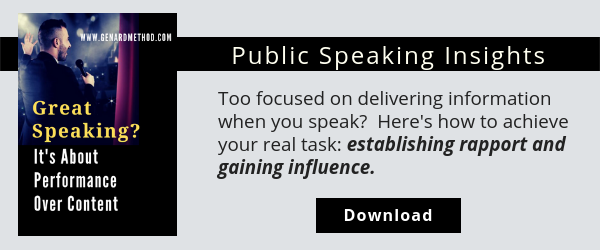Here's a brief quiz. Which of the following situations require you to be particularly good at developing and delivering a message?
a) A public speech or presentation.
b) A media interview.
c) A crisis situation.
c) A job interview.
The answer? — They all do, and in equal measure.
(When you're prepared for your next important speech or interview, don't spoil it by using "message killers." Download my free cheat sheet, "25 Words or Phrases to Avoid in Speeches and Presentations.")
Audience Persuasion and How to Accomplish It
If you don’t believe me, get a copy of a terrific book I just read, The Media Training Bible, by Brad Phillips. In the spirit of disclosure, I’ll admit here that Brad, who runs Phillips Media Relations, is a friend with whom I share a professional interest in successful communication skills.
But that doesn’t stop this book from being an ambitious and practical solution to the problem of coming across well when you’re facing a tough situation or audience. And when you think about it, every one of your audiences is tough, in terms of your need to persuade its members to think or act in the ways you’re advocating.
The subtitle of this book is 101 Things You Absolutely, Positively Need to Know Before Your Next Interview. And the author isn’t kidding. From “Ground Rules” to “Go Out There and Get ‘Em!,” you’ll learn all the essential skills you need to look and sound good, stay on point, say things that are memorable, and perform some handy Jiu-jitsu when the going gets rough.
What's foregrounded here may be media appearances, but there are some great lessons throughout the book for whatever type of speaking you do. And even as a media trainer myself for the past decade and a half, I learned things about messaging and speaking successfully that were eye opening and useful in equal measure.
An Easy-to-Use Handbook for Effective Speaking
Phillips has created a handbook that’s easy to digest even as it imparts some amazing lessons. For instance, did you ever think in terms of “unburdened messages”? I never had—but what perfect sense it makes. Let me quote from Lesson 11, “U Is for Unburdened”:
“U” demands that your messages remain unburdened by three things: wordiness, jargon, and abstractions. The more a message tries to say—and the more abstractly it tries to say it—the less likely it is to be memorable.
The follow-through? Speak clearly and concisely, and use real-life examples instead of abstractions. That’s solid advice whether you’re delivering a presentation, being interviewed on T.V. or radio, creating an online video, or answering a question in a job interview.
Ready to Put Some Sizzle into Your Public Speaking?
Failing to rebut a false premise thrown your way ("Questions Containing a False Premise") is dangerous, we're told (the exact advice I’ve given my diplomat trainees at the State Department for years). Otherwise, as Phillips reminds us, the audience will assume you would have corrected any error that exists. As I put it, “When you don't rebut, the erroneous assumption begins to harden like cement.”
The book's section of body language and voice is one that speakers of all stripes can benefit from, especially the lesson on energy and “sizzle.” Here, for instance, are some lines I love: “So don’t hold back. If you care about your topic, make sure the audience can tell just by looking at you.” All you august speakers who stand behind a podium like a statue in the Coliseum, this means you!
Crisis Communications: The 10 Truths
For any organization facing potential crisis situations, this segment of The Media Training Biblecombines some tough love messages with practical advice. Were you aware, for instance, that your receptionist—and possibly your security guards, and maybe even the spouses of employees—can benefit from training before a crisis hits and reporters call? That’s advice I haven’t seen before!
“How to Prepare for a Crisis,” and “How to Conduct a Real-Time Crisis Drill,” offer the best advice I’ve run across on preparing for crises that represent a combination of the most damaging and most likely scenarios to occur. That’s a potentially devastating situation any organization should get ready for.
The book is The Media Training Bible: 101 Things You Absolutely, Positively Need to Know Before Your Next Interview, by Brad Phillips. You can find it on Amazon here. And you can catch up with Brad at Phillips Media Relations.



